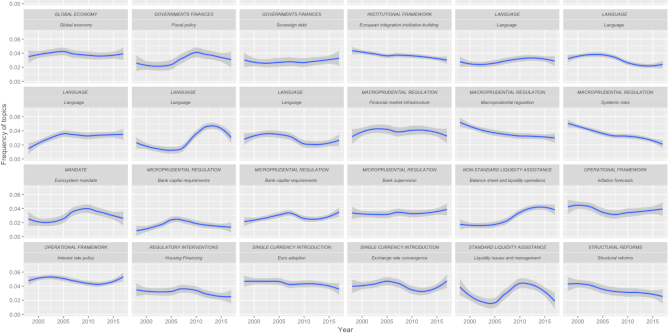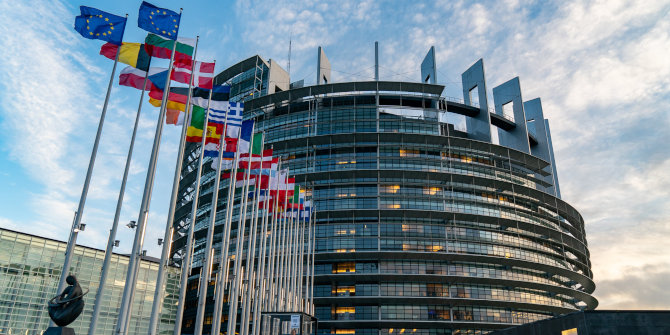 On 23 April and 7 May 2017, French citizens will vote for President François Hollande’s successor. While in most cases the names of the official candidates are yet to be disclosed, several leading political figures have already announced their intention to run in the election. Marta Lorimer discusses the possible candidates and what recent polling says about their chances.
On 23 April and 7 May 2017, French citizens will vote for President François Hollande’s successor. While in most cases the names of the official candidates are yet to be disclosed, several leading political figures have already announced their intention to run in the election. Marta Lorimer discusses the possible candidates and what recent polling says about their chances.
On the left of the political spectrum, the Socialist Party (PS) will be holding a primary election to select its presidential candidate in December 2016. In principle, the PS and the Greens have supported the idea of having a left-wing primary (Primaire de la Gauche), opened to candidates from all left wing parties; however, several issues will need to be sorted out before this can happen. In particular, parties will have to agree on the mode of scrutiny (two-round election or a preferential voting system), the number of candidates per party and the inclusion or not of a shared programme.
In the PS, the bigger question is whether the current president, François Hollande, will run for a second term. While he has not yet taken a stand, recent attempts to defend the results of his quinquennat, both in the media and via side initiatives – such as the slightly odd ‘Hé oh la Gauche!’, a rally organised by his supporters – suggest that he is considering to seek re-election.
Hollande, however, may be more of a hindrance than an asset for his party: his approval ratings remain abysmal, making him the most unpopular French leader of all time, and a recent poll suggested that a majority of respondents saw his candidature unfavourably. What is equally unclear, at this stage, is if the party would quietly rally behind him if he decided to run, or if, in the primary, he would have to face the opposition of fellow socialists who disapprove of his action in government. In particular, he could be challenged from the left-wing of the party by Benoit Hamon and former minister Arnaud Montebourg.
Should Hollande decide not to pursue a second mandate, there are several candidates who appear to be his most likely successors. Manuel Valls, the current prime minister is one of them. Finance minister Emmanuel Macron is another. In spite of repeated claims that he has not considered running for president in 2017, Macron’s recent creation of the movement ‘En Marche!’ has led commentators to speculate on the likelihood that he will run in the primary.
Macron is popular with the broader electorate and is generally considered as a ‘good candidate’; he is not, however, very popular with the left-wing electorate and with segments of the socialist party. Among the other likely candidates, one can also find the mayor of Lille, Martine Aubry, and former Justice Minister Christiane Taubira, who resigned in January due to disagreements over the issue of stripping French citizenship from certain individuals.
Beyond the PS, left-wing voters could find suitable candidates in other smaller parties. For the Greens, former minister Cécile Duflot has indicated an interest in running for president. However, she presides over a party in disarray, where pro-government forces do not always agree with her anti-Hollande stance. On the far left, Jean-Luc Mélenchon (Parti de Gauche – Left Party) has already announced his candidature. It is unclear if he will have the support of the Communist party led by Pierre Laurent in this – after years of positive relations, the two are in disagreement over the best strategy for the presidential election. Two more candidates from the fringes are also expected to join the race: Philippe Poutou (New Anticapitalist Party) and Nathalie Arthaud (Lutte ouvrière).
The contenders for the throne: Right, centre, far right
Hollande’s (or whoever the left-wing candidate will be) main contender is the right wing party, Les Republicains. In spite of less than satisfactory electoral results and deep-seated divisions between its members, the party is still the most likely to win the presidency in 2017. They will hold an open primary election on the 20th and 27th of November 2016. Contenders will have to obtain the support of 20 MPs, 2,500 party members and 250 elected representatives to participate.

Nicolas Sarkozy and François Hollande at the presidential inauguration on 15 May 2012 at Élysée Palace. The 2017 election may well be a re-run of this contest. Credits: Cyclotron / Wikimedia Commons
So far, the primary has potentially attracted more candidates than voters. With over 10 party members announcing their interest in running, but not all of them likely to achieve the sufficient number of ‘parrainages’ to run, it looks like it will likely be a race between former president (and leader of the party) Nicolas Sarkozy, MP Bruno Le Maire, former prime minister François Fillon and the frontrunner in the polls, the mayor of Bordeaux Alain Juppé.
Sarkozy has not announced his participation yet, as to do so, he would have to resign from his role as president of the party, however, he is largely expected to run in spite of his declining popularity. His greatest rival at the moment is Juppé, who has been campaigning since 2014 and has fed his campaign with a series of strategically-timed book publications. He fares very well in the polling and appears to be the only candidate who could beat Marine Le Pen in the first round of the presidential elections.
‘Outsider’ Bruno Le Maire and former Prime Minister Francois Fillon trail behind these two. Another contender could be Nathalie Kosciusko-Morizet. The former environment minister is in a difficult position within the party, however, after criticising Sarkozy’s position on the regional elections, where he refused to endorse the ‘republican rally’. Several other leading figures of the party have announced their candidacy, including Jean François Copé, Geoffroy Didier, Frédéric Lefebvre, Hervé Mariton, Nadine Morano, Jacques Myard, Jean-Frédéric Poisson, while Christian Estrosi and Xavier Bertrand, who had initially declared they would participate in the primary, have since withdrawn.
For the political centre, the most likely candidate will be François Bayrou (Democratic Movement). Bayrou has already declared that should the 2017 election present voters with the same choice as the 2012 election (namely, a Hollande-Sarkozy-Le Pen choice), he would run as president. However, Bayrou is quite close to Juppé, and should the mayor of Bordeaux win the Republican nomination, he may decide not to run and endorse the right-wing candidate.
He is not the only centre candidate, however: Jean Lassalle (former member of the Democratic Movement) has also declared he will be running for president. Slightly more to the right of the mainstream right (but not as far right as the Front National), Nicholas Dupont-Aignan, founder of Debout La France has also announced his candidature. However, he will not be taking part in the Republican primary.
More certainty is found on the far right, with Marine Le Pen, leader of the Front National (FN). Le Pen announced her candidacy in February 2016, becoming the first official candidate in the presidential run. Spurred by positive results in the 2015 municipal and regional elections, where the party managed to consolidate its growth and achieve its highest ever levels of support, she hopes to lead her party through to the second round.
The party’s programme has not yet been released, however, it is likely to be the usual combination of anti-EU measures, pleas for increased security and a focus on ‘the people’ and migration. While many in the party still doubt that she could win the presidency, reaching the second round would still constitute an achievement. The FN has not been able to reach the second round in a presidential election since 2002, when Jean-Marie Le Pen beat Lionel Jospin (PS) to face Jacques Chirac in the presidential run-off.
The polls so far
Polls so far suggest that the election will be dominated by the issues of terrorism and security, with unemployment and labour reform closely behind. Considering the terrorist attacks which have hit France in the past year and the prolonged state of emergency, this is perhaps unsurprising. What is also unsurprising given the climate and the central issues in the election is the Front National’s good showing in the polls.
The most likely second round scenario so far appears to be a Front National-Les Republicains run-off. The FN, in fact, would probably reach the second round with around 23-28% of the votes. Faced with Sarkozy, Fillon or Le Maire, Marine Le Pen would come first, while Alain Juppé would beat her and leave the FN in second place. In a run-off, however, all Republican candidates would beat Marine Le Pen – albeit with varying degree of success (70% for Juppe, 58% for Sarkozy, 63% for Fillon and 60% for Le Maire according to IFOP).
As for the left, several polls suggest that any left-wing candidate would not make it to the second round. The most recent round of BVA polls suggests that Hollande in particular would score around 15%, closely tailed by Mélenchon between 12-13%. An April IFOP poll even suggested that should by some electoral miracle Hollande manage to reach the second round, he would lose to Marine Le Pen, making her the first far right president of France.
One year out from the election, and with such an uncertain picture in terms of candidates, it is difficult to make predictions, however, the polling allows a glimpse of what the election may look like. In the upcoming months, as official candidates with defined programmes start appearing, the scenario will delineate itself more clearly. For the moment, however, the takeaway is that Alain Juppé is the candidate to beat, the left is unlikely to win and France may well relive the experience of the 2002 presidential election – with a far right party making it to the second round.
Please read our comments policy before commenting.
Note: This article gives the views of the authors, and not the position of EUROPP – European Politics and Policy, nor of the London School of Economics.
Shortened URL for this post: http://bit.ly/22vUkg7
_________________________________
 Marta Lorimer – LSE
Marta Lorimer – LSE
Marta Lorimer is an MPhil/PhD candidate at the London School of Economics. She holds a degree in European Studies from Sciences Po Paris and the LSE. Her research interests include far right parties, European politics and ideas of ‘Europe’.




